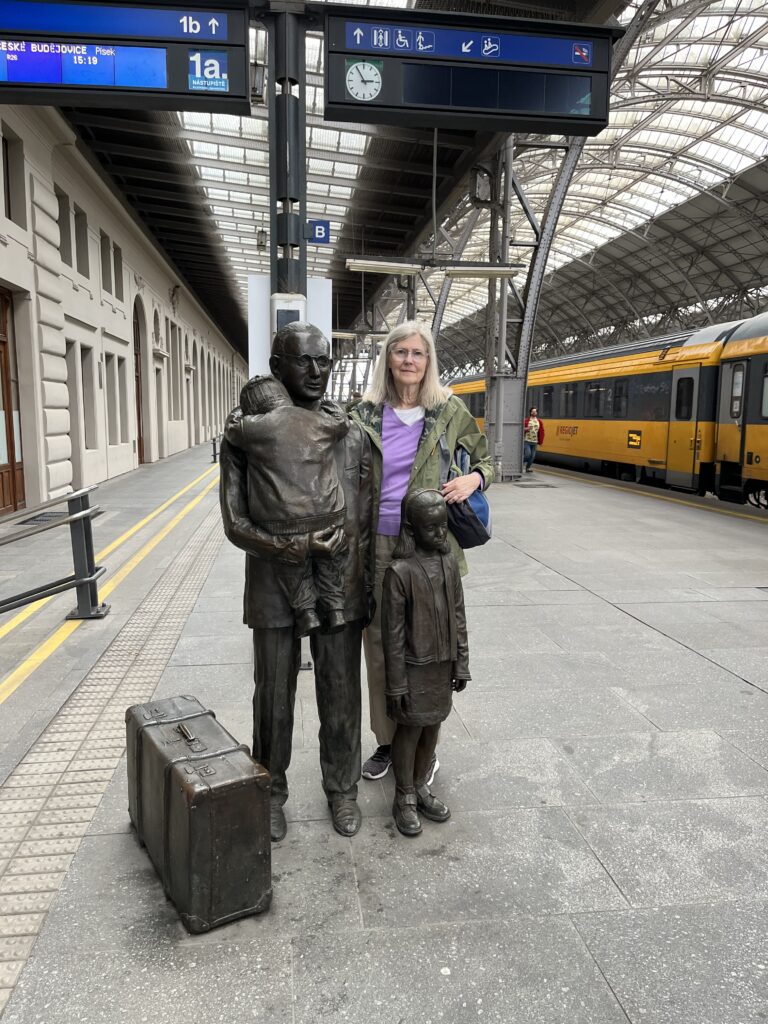In Prague. Today we made a prayer walk led by the leaders of Open Door Libraries, Jim and Laurie Barnes. We made ten stops and the photo at the bottom is the tenth, a statue of Nicholas Winton who, along with the help of others, transferred 669 children to Britain from Czech before the outbreak of WWII.
I’ve walked by some of the other stops without realizing their spiritual significance. It was a several- hours process so I will share a few highpoints for me. Firstly, I’ve completed the reading of CultureShock! Czech Republic (librarians always have great recommendations) and have started Prague Farewell. Today’s walk included prayer but echoed the reality of a life that began in Prague and ended in Prague but also did years in a concentration camp and lost every member of her birth family. The book describes her hiding from German SS soldiers after she escapes the camps to return to her beloved Prague only to be turned away by every non-Jewish person she had ever known. I’m not half way through but she ran down the streets I have been walking and was an acquaintance of Laurie Barnes. The autobiographer, Heda Margolius Kovaly, spent her last years in the neighborhood where I reside. All of this pensiveness flavored the day. High points of the prayer walk included Wenceslas Statue in Wenceslas Square where we prayed for the unity of churches and Christians plus the defeat of atheism (75% hold-over, no thank you to communism). The Palach and Zajic memorial plaques mark the site where two young men set themselves on fire to protest the human rights abuses under communism in 1969. We prayed for the ministries in the red-light district, the government at the Jalta Hotel where, hidden in the basement, there was an underground secret government bunker. We saw the balcony of a publishing house where, in November 1989 (where were you at the time), the Velvet Revolution ended communism in the nation (called so because there was no bloodshed). Other landmarks represent a history of oppression and loss of the identity of the Czech people. There is a homeless site/kitchen/center built in space under a freeway that is near the train station so lots of activity there so we prayed for immigrants and the homeless and those ministries that faithfully serve the needy. A first quote from Heda Margolius Kovaly that has me thinking about political things and food for thought in relation to how we pray in the present world circumstances. “In the last of the concentration camps that held me during the war, we worked in a brickyard, far from the camp. It was late autumn, beautiful but cold. In the mornings when we stood for roll call long before dawn, a thick crust of hoarfrost covered the ground. It would not thaw until afternoon. We wore nothing but short shifts made of burlap, no shoes, no underwear…The morning roll call lasted two hours. Then we marched to a funny little train made up of flatcars, each holding two long fences mounted on a wooden floor. The trip to work took one hour. Then there was a half-hour hike to the factory, twelve hours of passing along bricks, the trip back to camp, another roll call, a little turnip soup, a slice of bread, and a short restless night”.

